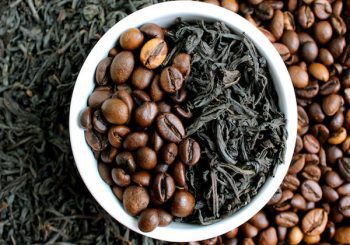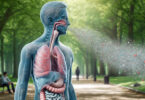Contributing writer for Wake Up World
Research has linked coffee and tea to several health benefits, including a recent study from Japan demonstrating those with diabetes who drink green tea and coffee experience a reduction in all-cause mortality.1 These results corroborate the impact beverage choices have on your health. At one end of the spectrum is soda, arguably one of the absolute worst choices of beverage to drink.
At the other end is pure water, the best for quenching your thirst and supporting optimal health. But there are times when you’re looking for something to savor and sip. In these instances, an excellent alternative is coffee or tea, both of which have earned a solid spot among healthy beverages.
After water, coffee and tea are the most commonly consumed beverages worldwide and one of the top sources of caffeine and antioxidant polyphenols in the U.S.2,3 One study was developed seeking to determine the impact drinking green tea or coffee would have on a population of people with diabetes.4
Coffee and Tea Lower Mortality With Type 2 Diabetes
What the researchers found suggests green tea and coffee consumption is associated with a lower risk of all-cause mortality. Past studies have evaluated the effect of regularly drinking tea or coffee on health, but few were carried out on a population of people with diabetes.5
The team tracked 4,923 people in Japan with a diagnosis of Type 2 diabetes whose average age was 66 for approximately five years. The participants were enrolled in the Fukuoka Diabetes Registry and each filled out a survey, as well as provided background on their lifestyle choices, such as alcohol consumption, number of hours of sleep each night, exercise and smoking.
During the study 309 of the participants died. The main causes were cancer and cardiovascular disease. The researchers compared the number who had a history of drinking neither coffee nor tea against those who drank one or both. They found people with the lowest potential for death drank the highest amount of coffee and green tea.
After analysis, the data showed drinking one cup of green tea daily lowered the potential for all-cause mortality by 15%. The potential for death lowered further in people who drank more. For instance, two to three cups of green tea were linked to a 27% lower risk and four or more were linked to a 40% lower risk.
Similar risk reduction was found in people with diabetes who drank coffee daily: One cup was linked with a 12% lower risk and two or more were linked with a 41% lower risk. However, in the group of individuals who drank both green tea and coffee every day, two to three cups of green tea plus two or more cups of coffee lowered their risk by 51% and four or more cups of green tea and one cup of coffee lowered their risk by 58%.
The combination of four cups of green tea and two or more cups of coffee reduced the risk of all-cause mortality by a whopping 63%. The researchers reported there was a 99.5% follow up rate that enabled them to “accurately investigate the association.”6 The researchers acknowledge there were some limitations, including the study was observational, meaning it cannot establish cause.
The data were also gathered from subjective assessments of the participants; other potentially influential factors, such as income and education, were not gathered. Finally, the green tea sold in Japan may not be the same type of tea found in other countries. The scientists wrote:7
“To date, no study has investigated the combined effect of green tea and coffee consumption on all-cause mortality. The present study determined that combined higher green tea and coffee consumption markedly reduced mortality.
Further, this cohort study included potential confounders, such as sleep duration, diabetic complications, lifestyle, physical activity, laboratory data, and medications. In conclusion, this prospective cohort study demonstrated that greater consumption of green tea and coffee was significantly associated with reduced all-cause mortality: the effects may be additive.”
Past Data Suggests Similar Effect in the General Population
Coffee and tea are rich in beneficial antioxidants and other plant compounds that have positive effects on your heart and brain health, weight loss and the prevention of chronic diseases. The results of years of study have found:
| Moderate coffee drinking reduces your chances of being hospitalized for heart rhythm problems.8 |
| Coffee may trigger a 30% increase in blood flow in your small blood vessels, including those around the heart.9 |
| One meta-analysis included data from 11 studies and nearly 480,000 people and found drinking two to six cups of coffee a day was associated with a lower risk of stroke.10 |
| In a study of 25,138 people, those who drank a moderate amount of coffee lowered the prevalence of coronary atherosclerosis.11 |
| The chlorogenic acid (CGA) in coffee protects neurons from glutamate neurotoxicity, which suggests it may have benefits for neurodegenerative diseases such as ischemic stroke.12 |
| Drinking three to five cups of coffee a day in middle age has been associated with a decreased risk of dementia and Alzheimer’s disease later in life.13 |
| Among people with mild cognitive impairment (MCI), those with higher blood levels of caffeine from drinking coffee were less likely to progress to full-blown dementia.14 |
| The polyphenols found in coffee have anticancer properties as demonstrated in a recent study of people with advanced or metastatic colorectal cancer. Those who drank two to three cups each day had a lower risk of disease progression and death.15 |
| Green tea reduces all-cause mortality, cardiovascular disease and blood pressure and oxidative stress.16 |
| Green tea has an immediate effect on endothelial function, helping the arteries to relax.17 |
| Drinking six or more cups of green tea daily lowered risk of developing Type 2 diabetes by 33% more than those who consumed less than one cup per week.18 |
| Habitual tea drinkers had a lower risk of atherosclerotic cardiovascular disease and all-cause mortality, had a 1.26 year longer life expectancy and lived 1.41 years longer without atherosclerotic cardiovascular disease.19 |
| A 2% green tea mouthwash reduced plaque and gingivitis after 28 days,20 and demonstrated the ability to improve the antibacterial action of saliva.21 |
| Drinking green tea is associated with a reduced risk of depression,22 obesity23 and ischemic heart and brain disease (stroke),24 and better vision.25 |
Compound in Green Tea Improves Zinc Absorption
In addition to the multiple benefits of green tea listed above, one polyphenol found in green tea, epigallocatechin-3-gallate (EGCG), helps zinc move into your cells where it can stop the replication of viruses. Zinc is an essential mineral found throughout your body and a cofactor in nearly 3,000 proteins.26
One of the effective treatments for early symptoms of COVID-19 is the combination of hydroxychloroquine and zinc.27 The hydroxychloroquine acts as a zinc ionophore, helping the zinc move across the cell membranes and into the cell where it can stop the progression of viral replication.28,29
However, hydroxychloroquine is not the only zinc ionophore. One lab study published in the Journal of Agricultural and Food Chemistry several years before the pandemic demonstrated EGCG and quercetin were effective zinc ionophore compounds.30 Both are flavonoids and act as antioxidants and signaling molecules.
Choose Organic and Ditch the Dairy
To enjoy the benefits of coffee and tea it’s important to remember that quality is key. Most coffee produced is heavily contaminated with pesticides and may be one of the most heavily sprayed crops.31 When I speak about the benefits of coffee it should be understood I am talking about organic (ideally fair trade) pesticide-free coffee.
Another disadvantage is that ground beans survive only a week before losing flavor. The rate of change increases dramatically as the beans are ground. So, another basic principle is to grind your own coffee beans. Overall, the healthiest form is organically grown, freshly ground coffee that is served black without milk or sugar.
Adding dairy could interfere with absorption of chlorogenic acids, and sugar contributes to insulin resistance. If you’re using a drip coffee maker be sure to use nonbleached filters since some of the chlorine leaches into the coffee during the brewing process.
When you’re choosing tea, seek out loose leaf tea since many of the current tea bags are made with plastic. These bags can leak up to 11.6 billion microplastic pieces and 3.1 billion nanoplastics with every cup you drink.32 Consider adding a squeeze of lemon juice to your tea, which may help stabilize the beneficial catechins so you can absorb more of them.33
There are three main varieties of tea: green, black and oolong. The differences have to do with how the leaves are processed. Interestingly, EGCG is sensitive to water temperature, so brewing in 80 degrees Celsius or 176 degrees Fahrenheit releases only 60% of the EGCG from the tea leaf.34 Hotter temperatures may help you get even more antioxidants out of your tea.
References:
- 1 MedPage, October 20, 2020
- 2 Medpage Today, August 29, 2005
- 3 EurekAlert! August 28, 2005
- 4, 6, 7 BMJ Open Diabetes Research and Care, 2020;8:e001252
- 5 MedPage Today, October 20, 2020
- 8 The Permanente Journal, 2011;15(3)
- 9 American Heart Association News, November 20, 2013
- 10 American Journal of Epidemiology, 2011;174(9)
- 11 BMJ Heart, 2015;101:686
- 12 Life Science, 2015;139:69
- 13 Journal of Alzheimer’s Disease, 2010; 20 Suppl 1: S167
- 14 Journal of Alzheimer’s Disease, 2012;30(3):559
- 15 JAMA Oncology, 2020; doi:10.1001/jamaoncol.2020.3938
- 16 Diabetes and Metabolism Journal, 2013;37(3) para 1
- 17 European Journal of Cardiovascular Prevention & Rehabilitation June 2008, 15(3):300-305
- 18 Annals of Internal Medicine, 2006; 144(8)
- 19 European Journal of Preventive Cardiology, 2020; doi.org/10.1177/2047487319894685
- 20 Oral Health and Preventive Dentistry, 2015;13(3)
- 21 Plos|One 2014;9(1)
- 22 Nutrients, 2018;10(9)
- 23 Nutricion Hospitalaria, 2017;34(3)
- 24 International Journal of Cardiology, 2016;202:967
- 25 Journal of Agricultural and Food Chemistry, 2010;58(3)
- 26 International Society for Zinc Biology
- 27 MedRxiv, doi.org/10.1101/2020.05.02.20080036
- 28 PLOS|One, 2014;9(10)
- 29 Cell Discover, 2020;6(16)
- 30 Journal of Agricultural and Food Chemistry, 2014;32(62)
- 31 Tox Free Family, Here’s What Could Be In Your Coffee
- 32 McGill University, September 25, 2019
- 33 Molecular Nutrition and Food Research, 2007;51(9)
- 34 Acne Einstein, July 4, 2012 Brewing conditions
Originally published at mercola.com and reproduced here with permission.
Recommended articles by Dr. Joseph Mercola:
- High Blood Pressure Linked to Increased Risk of Dementia
- Cholesterol Does Not Cause Heart Disease
- CBD Has Unique Ability to Cross Blood-Brain Barrier
- Water and Homeopathy: Latest Discoveries at Science’s Cutting Edge
- Sugar Substitutes: What’s Safe and What’s Not
- Unveiling the Depths of the Human Psyche: Psychedelics May Unlock Parts of the Mind That Are Normally Inaccessible
- What Should Your Poop Look Like?
- The Endocannabinoid System and the Important Role it Plays in Human Health
- Magic Mushrooms May Hold Key to Long-Term Relief from Anxiety and Depression
- Scientific Links Between Processed Foods and Depression
About the author:
Born and raised in the inner city of Chicago, IL, Dr. Joseph Mercola is an osteopathic physician trained in both traditional and natural medicine. Board-certified in family medicine, Dr. Mercola served as the chairman of the family medicine department at St. Alexius Medical Center for five years, and in 2012 was granted fellowship status by the American College of Nutrition (ACN).
While in practice in the late 80s, Dr. Mercola realized the drugs he was prescribing to chronically ill patients were not working. By the early 90s, he began exploring the world of natural medicine, and soon changed the way he practiced medicine.
In 1997 Dr. Mercola founded Mercola.com, which is now routinely among the top 10 health sites on the internet. His passion is to transform the traditional medical paradigm in the United States. “The existing medical establishment is responsible for killing and permanently injuring millions of Americans… You want practical health solutions without the hype, and that’s what I offer.”
Visit Mercola.com for more information, or read Dr. Mercola’s full bio and resumé here.

If you've found value in our articles, we invite you to support the release of our brand-new book, "Gratitude Practices for Kids: A Practical Guide for Adults to Instill a Spirit of Appreciation and Positivity in the Next Generation."
"Gratitude Practices for Kids" brings together over 25 innovative and accessible practices designed to enhance gratitude in everyday life. This comprehensive guide is backed by 17 scientific studies, ensuring each concept is grounded in research, underscoring our commitment to nurturing growth, emotional intelligence, and positive interactions between adults and children.
We encourage you to opt for the paperback version to celebrate this new release. Dive into its fresh pages away from digital distractions, allowing you to immerse yourself in the transformative practices it offers.
Over recent years, Wake Up World has faced significant online censorship, which has impacted our financial ability to operate. Moving into book publishing represents a strategic step to secure the ongoing funds needed to continue our mission. By purchasing Gratitude for Kids, you help us keep our content free and accessible to everyone, avoiding needing a paywall. With over 8,500 articles published in the last 13 years, we remain dedicated to keeping our valuable content open to all.









